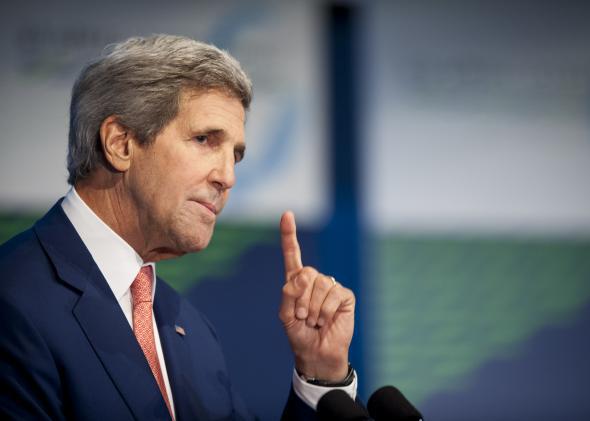The final round of negotiations over Iran’s nuclear program began today in Vienna, only three days before their June 30 deadline. Secretary of State John Kerry and his Iranian counterpart, Foreign Minister Mohammad Javad Zarif, told reporters they were “hopeful” but could not promise that they would be able to work through the several remaining sticking points:
Asked whether they were optimistic that they would be successful this week, Kerry said, “Well, I think it’s fair to say that we’re hopeful. We have a lot of hard work to do. There are some very tough issues, and I think we all look forward to getting down to the final efforts here to see whether or not a deal is possible. I think everybody would like to see an agreement. But we have to work through some difficult issues.”
Opponents of the deal in both Iran and the US have been making a lot of noise this past week, in an apparent attempt to derail the talks at the eleventh hour. These late-breaking developments have cast doubt on the ability of negotiators to work out a final agreement, but as Slate’s own Fred Kaplan pointed out yesterday, negotiations over a framework agreement in March and April were though to have failed until the last minute, when it turned out that they hadn’t. In nuclear diplomacy as in baseball, it ain’t over ‘til it’s over.
Also, Tuesday’s deadline for a comprehensive deal is softer than it looks. The parties have extended their deadlines before without the process collapsing, after all. As diplomats in Vienna explained to Reuters, the real deadline is July 9, because any deal made after that date will be subject to 60 days of review by the US Congress, rather than 30:
Negotiators involved in the talks fear that such a lengthy delay, which would also hold up the cancellation of United Nations nuclear-related sanctions by the U.N. Security Council, would be too long and would create the opportunity for any deal agreed in Vienna to unravel.
The stakes for both Iran and the US are very high. A foreign policy achievement of this magnitude would be the cherry on top of what has been a very good week for President Obama, not to mention the benefit of avoiding a deadly and costly war. Iranians, meanwhile, have high hopes that a deal that entails lifting sanctions on Iran will improve their lives in the near term, according to one recent survey:
Asked how long they believed it would take for changes resulting from a deal to materialise, 61 percent of respondents said they would see Iranians gaining greater access to foreign-made medicines and medical equipment in a year or less while a similar number—62 percent—thought they would see “a lot more foreign companies making investments in Iran” in a year or less.
A slightly lesser 55 percent thought they would see “a tangible improvement in people’s standard of living” within a year.
Iranian civil society leaders are also cautiously optimistic that a deal would have tangible economic benefits and might even give president Hassan Rouhani, who campaigned on ending Iran’s international isolation, the leverage he needs to push through political and cultural reforms.
